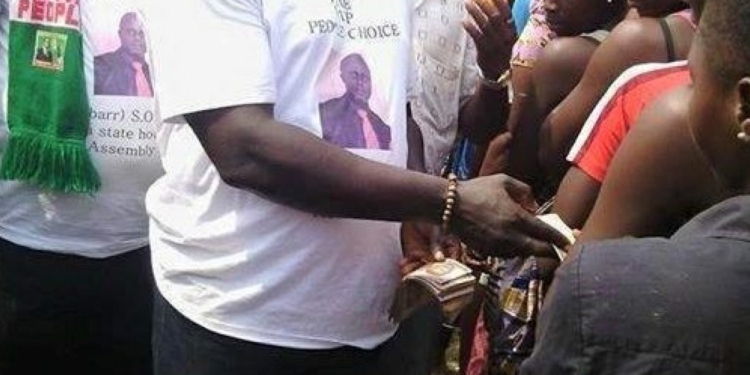The immediate past Resident Electoral Commissioner in Rivers State, Obo Effanga on Saturday urged the Federal Government should improve the economy and put the country in better perspective to check the trend of vote buying in Nigeria during electioneering.
Effanga said although Nigerians in the Diaspora should not be disenfranchised in any general election, Diaspora voting would not be possible for now because of the lack of advanced technology.
This was stated by Effanga at the 2022 Annual General Meeting and Fund Raising Dinner/flag off of the proposed lavatory and tree planting projects in Imo State University, Okigwe and Abia State University, Uturu organised by the Zenith Environmental and Social Protection Network.
According to him, the menace of vote buying remained a societal problem and a reflection of Nigeria’s level of development.
Effanga who has been nominated for re-appointment for another five years by the President Muhammadu Buhari, said that the introduction of technologies into the electoral system had made it difficult for politicians to rig elections through other means.
He said, “If people are buying votes it means votes are important and they can only win on the basis of the votes. And it is because the votes are counting and being counted, that is why people are emerging elected on the basis of votes; that is why the politicians are going after the votes by whatever means. They find out that, perhaps the easiest means for them to get the votes is to pay the people to vote for them. And that is what is happening.
“On the part of INEC, our interest is that anybody who is qualified to vote is given an unfettered access to vote and when the person has voted, the vote is counted and results are declared on the basis of the counted votes.
“The issue of vote buying has now become a national malaise. It now becomes the responsibility of everyone who is interested in strengthening democracy to ensure that we reduce vote buying.
“How do we do that? Information and communication. We need to let the voters know why they should not sell their votes. Because when they do, they cheapen the votes based on the amount they collect and they say to them ‘you can go ahead and do whatever you want to do.”
Speaking on what INEC was doing to reduce the menace, Effanga said the commission had ensured that at the polling unit, cubicles are kept at a distance from the preying eyes of members of the public who are around there.
“As much as possible, we are trying to do that, depending also on the space we have in the polling unit. Sometimes, when you go to these polling units, it is mostly in a congested area because these are communities where you have a lot of facilities.
“It could be by their market square and school. So, the space is limited to the number of people in the polling unit. Now, we also need to talk to the voters themselves. We need to talk to the political parties that they should try and win on the basis of how they have sold their plans and programmes to the electorate. But there is another point about vote buying that I will like to raise. I think that too often people lay emphasis on what I refer to as the retail part of vote buying.
“There are different levels of vote buying and selling. There is a wholesale one; where long before the election, the aspirants are going around meeting the elites; big men and women like themselves, political leaders, sometimes, religious and community leaders and making promises to them and offering them things. These people, in return, endorse them to the extend that something has been exchanged. We hardly talk about that.
“There is the middleman level of vote buying which happens at party primaries. Suddenly we now talk of delegates who have become super rich. That is also vote buying.
“But the elites do not talk about it because they are the ones involved. On election day, the person now opens his or her retail shop to sell votes. That is the one everybody talks about.
“If we are committed to stopping it then we should talk about it all through. It is a societal problem and a reflection of our level of development. So if people are unable to access the good things of life they give their votes for any amount of money. But by the time our economy improves those things would be a thing of the past.”
Effanga added that INEC was working to ensure that the issue of Diaspora voting is laid to rest once and for all, staying “any Nigerian in any part of the world should be able to vote because the person is a Nigerian and what happens in Nigeria is of concern to the person.”










Discussion about this post